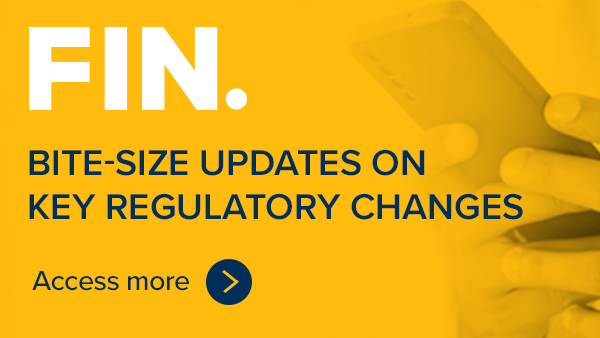
Finally, 31 July 2023 arrived and FCA's Consumer Duty rules for current products and services took effect. The Consumer Duty has been a long time in the making, and expectations on firms during the implementation period have been high. Firms have had to do so much in the past year that some may be tempted to take their collective feet off the gas, but there's no time to relax. The next stage has started, which will involve FCA looking at all interactions with retail customers through a Consumer Duty lens. The proof of whether firms have got compliance right will be both in the results of their own monitoring and follow-up actions, and in FCA's messages to the industry generally and to specific firms who catch their attention.
In this article, originally published in Compliance Monitor, Emma Radmore and Lucy Hadrill at Womble Bond Dickinson look back at what firms should have done in the run up to implementation and forwards to what FCA will expect them to do now.
Recap: what is the Consumer Duty?
The Consumer Duty builds on long-established regulatory principles and requirements on fair treatment of customers and has introduced a new FCA Principle, Principle 12, which requires all firms to "act to deliver good outcomes for retail consumers". It could be described as TCF on steroids.
The new Principle (which is also reflected in the Conduct Rules) is backed up by cross-cutting rules, which are to:
- Act in good faith towards retail customers
- Avoid causing foreseeable harm to retail customers
- Enable and support retail customers to pursue their financial objectives.
The final high level regulatory jigsaw piece is the four outcomes FCA wants to see, which FCA says "help to define" what is required by Principle 12 and the cross-cutting rules but do not "exhaust" them. The outcomes relate to:
- Products and services
- Price and value
- Consumer understanding
- Consumer support.
Essentially, looking at everything firms do that affect retail customers first and foremost from the point of view of the outcome for that customer.
Actions over the past year
Since FCA published its final rules and guidance on the Duty in July 2022, it has constantly reminded firms of its expectations, and backed up the rules and guidance with a series of both general and sector focussed letters, webinars, reviews and checklists.
Firms should have spent the past year assessing the impact of the Duty on their business. They should have:
- Ensured their boards understand the importance and requirements of the Duty. It should be clear that the board has taken an active role in the implementation planning and in the process for ongoing outcomes monitoring, and understands its obligations to attest at least annually whether the firm is delivering good outcomes for its customers and, if not, the plan for change
- Allocated appropriate responsibilities – they should have assessed the role and responsibilities of all relevant staff – which is far from only customer-facing staff and the compliance function, and put in place policies and training to ensure staff know what is expected of them
- Considered the application of the Duty to each of their products and service lines. This should have included (if relevant to the firm in question):
- A review of the product development and governance process to assess (and implement) any enhancements needed to ensure the Duty is met
- A review and update of standard templates for customer communications
- A review and update of call centre policies and procedures and call scripts
- Addressed the distribution chain – they should be clear that every firm in the distribution chain has its place and that all relevant firms will work together to ensure the outcomes are met. This could include contractual changes to clarify the roles and responsibilities of each firm in respect of the Duty
- Stress tested each element of the customer journey, pre-, during and post-sale, looking at any barriers that consumers could face regardless of the method or medium they choose for their journey and as ever with a particular regard to vulnerable customers
- Updated internal policies and procedures, not least governance arrangements and policies, the SMCR policy, the staff handbook, manuals for customer-facing staff, communication procedures, complaints procedures and vulnerable customer policies
- Mapped existing management information against the standards of the Duty to identify any gaps put in place measures to enable the firm to obtain appropriate MI to track delivery of good customer outcomes
- Reviewed all relevant contractual arrangements, including with customers, distributors, manufacturers and other third parties, to ensure that firms will receive adequate and appropriate MI in all cases and that, where appropriate, service level agreements and other reporting requirements will allow the firm to assess and ensure its compliance with the Duty
- Critically for the future, they should have in place a suitable monitoring programme, with plans for remediation if the results of the monitoring mean there's room for improvement. The monitoring programme cannot of course be a "one-size-fits-all" model and must properly track the firm's business and risks. So, for example, firms dealing with intermediaries ideally will have built into their contracts the requirement that intermediaries notify them of actual or potential customer harm and agree to work with the firm to remediate it.
What can we expect from FCA?
It would be unrealistic of FCA to expect all firms to have got every element of compliance right and fully in place. Its focus in everything it does in respect of firms whose business falls within scope of the Duty will be on compliance with it. However, as with most regulatory changes, while it will be sure to warn firms whose policies and procedures are lacking, it will focus on serious breaches and cases where it sees the most evidence of harm or risk of harm to consumers.
To prepare themselves for FCA's attentions, firms could do worse than checking themselves against the key questions that FCA published at the end of June to help firms in their last month before implementation. The questions were relevant at the time and will remain relevant for existing and new products, services and ways of doing business. They focus on:
- Characteristics of products and services:
- Are they well designed to meet the needs of customers in their target markets?
- Are they designed to perform as expected?
- What testing have firms carried out?
- Do they have any features that could cause harm to vulnerable customers? If so, what changes are needed and have they been made?
- Value:
- Firms should have carried out fair value assessments – what action have they taken following them?
- How are firms ensuring this action is effective in improving consumer outcomes?
- Communications and support:
- How are firms testing the effectiveness of their communications and acting on the results of the tests?
- How are firms adapting their communications to help vulnerable customers, and how are they testing the effectiveness of the adaptations?
- Have firms assessed how their customer support meets the needs of customers with vulnerability characteristics?
- How have firms satisfied themselves that their post-sale support is as good as their pre-sale support?
- Staff and training:
- Have firms ensured that all individuals throughout the firm understand their role and responsibility in delivering the Duty – including those in control and support functions?
- Have firms trained relevant staff on the new processes and procedures?
- Where firms use appointed representatives or other unregulated intermediaries, have they arranged training for these?
- Risk assessment:
- Have firms identified the key risks to their ability to deliver good customer outcomes?
- Have firms put in place appropriate mitigants?
- Monitoring and MI:
- What data, MI and other intelligence are firms using to monitor fair value on an ongoing basis?
- What data, MI and customer feedback are firms using to support their assessments of the effectiveness of customer support to vulnerable customers?
Firms will need to continue to use all relevant market and product specific information and statistics to analyse key risk areas. FCA's latest Financial Lives survey made concerning reading, not least in terms of the difficulties customers reported in contacting their providers and the large degree of mistrust in the industry as a whole. Also, as the cost of living crisis continues, the need for and cost of financial products remains in sharp focus – particularly as vulnerable people risk either keeping unsuitable products which do not represent good value for them, or cancelling products which they need. As firms begin to live with the new way of checking and testing themselves, the value and importance of the right information feeding up to management, which in turn will inform compliance assessments and remediation programmes will be critical.
This article is for general information only and reflects the position at the date of publication. It does not constitute legal advice.





